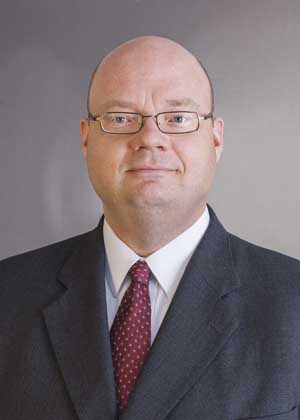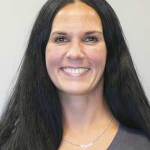
Jon DeVaney
The new Washington Tree Fruit Association plans to expand its services to the industry, says President Jon DeVaney, who will be busy working on legislative affairs in the state capital of Olympia in the coming session.
The merger of four organizations will be complete when the association absorbs the Washington State Horticultural Association after the annual hort meeting in early December. The Washington Growers Clearing House Association, Yakima Growers-Shippers Association, and Wenatchee Valley Traffic Association merged at the end of August.
The association’s annual budget will be $1.5 million, which is about $250,000 less than the combined budgets of the organizations it is replacing. It will be funded by dues of 3/4 cent per 40-pound equivalent box on apples, pears, cherries, and soft fruit. Packers will remit the dues directly to the association. Growers will not be able to opt out of paying dues, though they can ask to be removed from the mailing list.
“To have growers automatically be members, unless they choose not to be affiliated by saying, ‘Take me off your list,’ means we maximize the political influence by saying we represent all the growers of the industry, and all the packers, and all the marketers,” he said.
DeVaney said the new association will not just maintain services that the other organizations provided but will improve on them. He expects that the association will provide more data to producers and expand its educational role. It will also play a more proactive role in state legislative and regulatory affairs so that it’s not just pushing back on issues that could have a negative impact, but is asking for improvements to rules and regulations.
Ranie Haas joined the staff in October in the new position of director of regulatory and industry affairs. DeVaney will head the legislative effort, working—at least for the first session—with Jim Halstrom, a longtime contract lobbyist for the Hort Association, and Dave Ducharme, lobbyist for the Growers-Shippers Association in Olympia.
“I’ll spend some time on going to Olympia to identify priorities and explaining the industry’s position on issues that come up,” he said.
Legislative affairs
DeVaney, 43, has considerable experience in legislative affairs. He grew up in Washington’s Kitsap County and finished high school in Kennewick, where his parents still live. He has a bachelor’s degree in history from the University of Washington and a master’s degree in history at Georgetown University in Washington D.C.
“I was in a PhD program, and then I realized that was a good route to unemployment,” he said. “The academic job market was not that strong.”
In 1995, while DeVaney was pondering over what else he might do, Doc Hastings was elected to the House of Representatives from Washington’s fourth congressional district. DeVaney got a job first as an intern and then as a legislative assistant with Hastings in Washington, D.C., and transferred to the Yakima, Washington, district office in 2000.
Two years later, he joined the staff of the Northwest Horticultural Council as director of legislative and regulatory affairs. He left in 2003 to rejoin Hasting’s staff and help run George Bush’s re-election effort. In 2005, he took a political appointment as Washington State’s director of Rural Development, which is part of the U.S. Department of Agriculture. The agency’s many programs included building farmworker housing, helping to build rural infrastructure, and providing loans to businesses to produce value-added agriculture products.
“But, all good things come to an end, including presidential administrations,” DeVaney said, “And 2009 was not a good time to be a Republican or unemployed.”
Hastings had been appointed a ranking member of the House’s Natural Resources Committee, so DeVaney returned to work at Hastings’ office in Washington, D.C., though his home was in Yakima. His wife, Karen, who was caring for their two young sons, was not interested in relocating to the capital. When Keith Mathews left as manager of the Yakima Valley Growers-Shippers Association, DeVaney successfully applied. He was appointed president of the Tree Fruit Association last summer.
Taxes
DeVaney said state legislators need to be aware that the tree fruit industry is a huge benefit to the state’s economy and not one they should take for granted. If they make policy decisions that harm the industry, many thousands of jobs could be in jeopardy.
He’s concerned about how the legislature plans to pay for education and road maintenance, for example.
“They’re looking for billions of additional dollars to fund education and other priorities,” he said. “Our industry can’t easily absorb a lot of additional costs when we’re trying to market a large crop in a competitive environment.
“If they make regulations that are difficult or expensive to comply with, we could find ourselves at a competitive disadvantage very quickly and lose a lot of market share. International and domestic consumers love our products, but they’re sensitive to price.”
He’s particularly concerned that the state might increase gas taxes to compensate for a shortfall in revenues because of more fuel-efficient vehicles or introduce a carbon cap-and-trade scheme or carbon tax. About 97 percent of Washington’s apples are shipped out of state.
He pointed out that the industry has become even more reliant on trucks for shipping fruit to market since rail capacity has been declining at the same time as crop volumes have been increasing.
“Having the transportation to move that crop is very important,” he said. “It’s a concern because we’re not easily going to switch to electrically powered vehicles.” •
_______________
Ranie Haas joins new association

Ranie Hass
Ranie Haas has joined the Washington State Tree Fruit Association as director of regulatory and industry affairs. She will focus on how the various state agencies are implementing regulations that impact the tree fruit industry.
Haas grew up on an orchard in Wapato, Washington. After earning a bachelor’s degree in political science from Central Washington University in 1997, she worked at Congressman Doc Hasting’s office in Yakima for six years. She then worked in hop purchasing for Anheuser-Busch and most recently was a sales assistant for Washington Fruit and Produce Company.






Leave A Comment